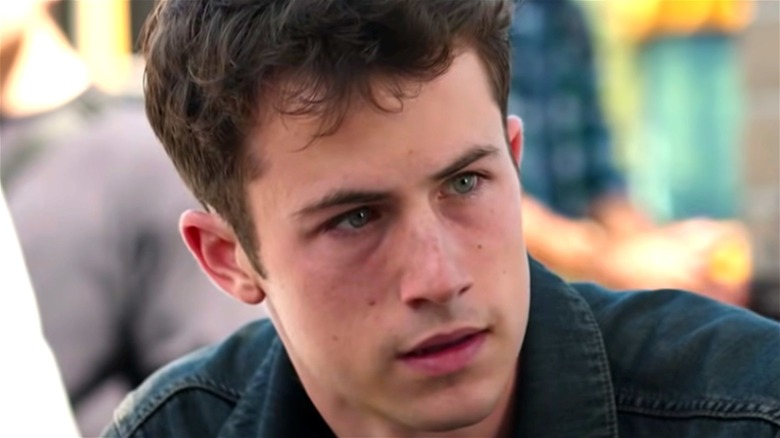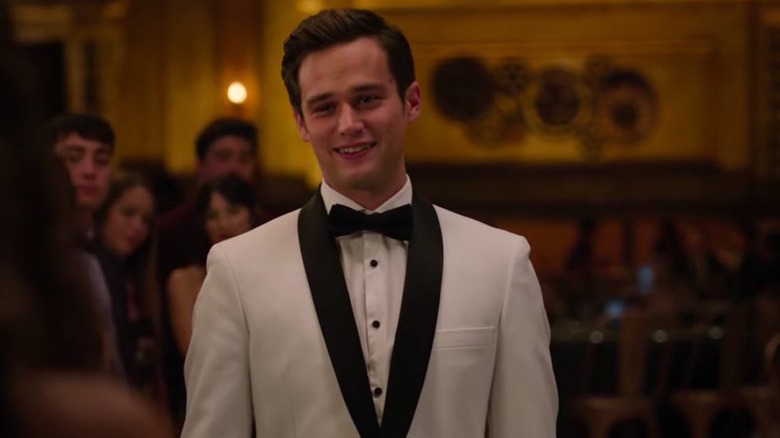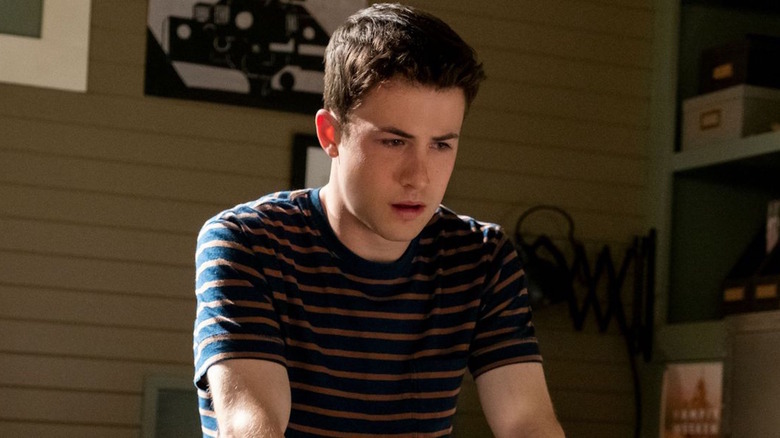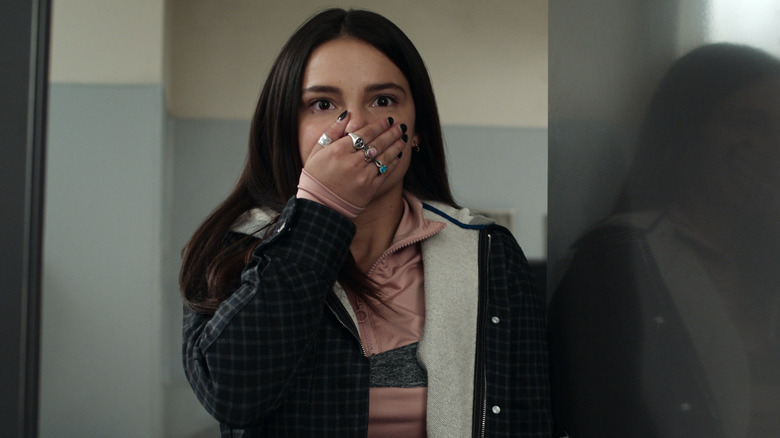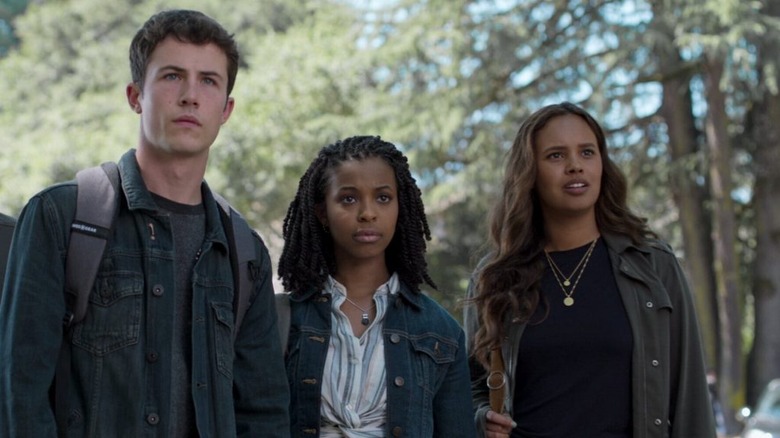The Ending Of 13 Reasons Why We Really Wanted
In 2017, the teen drama "13 Reasons Why" premiered on Netflix and quickly garnered a passionate response from fans. Adapted from Jay Asher's novel of the same name, the first season largely followed a similar plotline to that of its literary predecessor (via Seventeen). In the original installment, Clay Jensen (Dylan Minnette) receives a box of cassette tapes from his classmate Hannah Baker (Katherine Langford). After her tragic death, Clay begins to listen to all 13 tapes, which list the many reasons why Hannah ultimately took her own life. Initially conceived as a limited series, the show's wildly popular debut led to three more seasons, the last of which aired in 2020.
During this time, "13 Reasons Why" remained divisive, spurring mixed reactions from both viewers and critics alike, per WECT. While the show marketed itself as a searing exploration of the mental health struggles that teens face today, it also received pushback for its often graphic depictions of violence and sexual assault. After the first season premiered, mental health advocates criticized the explicit portrayal of Hannah's death, citing concerns that such imagery could harm young viewers with self-harm ideation. Despite these critiques, it took two years for Netflix to eventually remove the scene.
As a result, while some viewers wholly committed to the show's ever-expanding narrative, others, such as Vulture, condemned "13 Reasons Why" for its needlessly dark melodrama. After the series finale, the ending similarly incited a varied response from viewers. Continue reading below to find out how we really hoped "13 Reasons Why" would end.
Justin gets the redemption he deserves
In one of the biggest shocks of the last season, fan-favorite character Justin Foley (Brandon Flynn) unexpectedly dies after receiving an AIDS diagnosis in the hospital. Overall, Justin's death is particularly galling for a few reasons. First and foremost, HIV is a highly treatable disease, per Yale Medicine. Not only does Justin's bewildering death play into the dangerous stigmatization of AIDS, but it also recklessly implies that proper testing can be scary and bleak. As Redditor u/Pr0udSn0wflake rightly pointed out, "HIV is no longer a death sentence and to reignite that only hurts the narrative of survival ...The story of HIV needs to be one of survival, especially to more youthful viewers."
Secondly, in terms of narrative scope, Justin's cruel death is a betrayal of the thematic underpinnings of the show. For a series that ostensibly sought to portray the inner workings of mental health, it also spent a significant amount of time destroying the hard-won redemption of its characters. For four seasons, Justin combatted homelessness, addiction, and PTSD. Yet, finally, he had found a loving home and a group of loyal friends. He had worked steadily to become a kindhearted, open-minded person. Near the end of the series, Justin arguably represented a symbol of hope for those with similar struggles -– after his darkest moments, he had finally found the light. In this way, the show should have respected Justin's growth and allowed him to flourish. With his new support system, he could have truly made a beautiful life for himself and inspired others to do the same.
Clay receives proper mental health treatment
Throughout the last season, protagonist Clay Jensen displays clear struggles with his mental health. Repeatedly, he hallucinates the figures of his dead high school classmates, Bryce (Justin Prentice) and Monty (Timothy Granaderos), and strains to delineate between his delusions and real life. Crippled by guilt and trauma, he even imagines blood gushing from the showers in the locker room. After an ill-advised school shooting "staged" by local police officers, Clay impulsively grabs an officer's gun. In a fan Reddit thread deconstructing the finale, u/tate_declan0419 noted, "I wished they did more with Clay's mental health. I feel like, based on the severity of it, breaking out of the hospital and talking to a therapist for little bit isn't going to fix that fast." In response, u/Snoo_11192 added, "I agree! I don't feel that the mental health side of the season has been fully developed and explored (I am a clinical psychology student)."
Over and over again, Clay demonstrates that he is experiencing an immense amount of psychological pain. Early on in the season –- or, even better, starting all the way back in Season 1 after Hannah's death –- Clay should have received ongoing treatment for his mental health struggles. This would have been a powerful way to show a main character coming to terms with a psychological diagnosis and acquiring the tools to forge ahead. After all, a diagnosis is only the first step. The last season should have shown Clay speaking to a therapist or psychiatrist, taking medication, and absorbing helpful tips for navigating and unpacking his trauma. In the end, perhaps Clay would have been able to openly talk to his friends about his treatment and explore new ways to maintain his health while in college.
Estela, Diego, and Winston have greater narrative purpose
In the final season, Estela de La Cruz (Inde Navarrette), Diego Torres (Jan Luis Castellanos), and Winston Williams (Deaken Bluman) join the main cast as characters attempting to make sense of whether or not Monty actually killed Bryce. While the rest of the ensemble strives to keep the truth about Bryce's demise a secret, these three students work as narrative foils, pushing back against the silence that has shrouded the core players.
However, Estela, Diego, and Winston never really have enough to do –- and they all seemingly give up the cause in the end, raising questions about why they even showed up in the first place. u/tatedeclan0419 opined, "I wish we got to see Monty's death scene and more of Estela- so many things were left up in the air with that." As Monty's younger sister, Estela, initially asks the other students about her brother, but her feelings for Tyler appear to affect her investigation.
Similarly, Diego, one of Monty's friends, tries to unravel the mystery of who really killed Bryce, but eventually falls for Jessica and changes his mind. Redditor u/baldemen criticized the lack of forward action: "I didn't like how Alex got away with murder, how Monty's name didn't get cleared, and how Winston didn't raise more hell than he did. I wish people had consequences for their actions on the show." Prior to Monty's death, Winston nursed an intense crush on his bully, leading to his desire to find out more. However, he also halts his inquiries after a vision of Monty's "ghost" approaches him. Once they speak, his obsession with the case ends (yes, really).
Considering their roles, at least one of these characters should have committed to sharing the truth about what happened to Monty. Instead, they barely made any kind of dent in the series. As a result, their presences were head-scratching additions to an already overly complicated story.
There is a clear, overarching plotline for the main characters
In general, the final season of "13 Reasons Why" arguably suffered because it did not have a distinct, overarching plotline. Characters moved from scene to scene without any obvious momentum or motivation. As Redditor u/stv7 explained, "The lack of plot meant that the episodes were largely individual stories that were so dramatic and convoluted and yet completely boring and lacking substance." From Clay's mental health struggles to Estela's lackluster presence, the series failed to authentically follow the arcs of its characters.
Initially, the show seemed to lean into an angle of mystery, introducing the ominous question: "Who died?" However, any substantial clues leading to this reveal were largely ignored for the bulk of the story, culminating in tonal whiplash with Justin's unforeseen death. Obviously, another clear through-line should have been some sort of carefully-plotted investigation into whether or not Monty was framed for killing Bryce. But, again, this type of storytelling was not fully mapped out, leading to an ending that did not know what to really do with any of its characters.
As a result, "13 Reasons Why" completed its run without a well-earned resolution. The show should have committed to at least one of the storylines above, but instead, it seemingly depicted half-hearted versions of all of them, which produced a hodgepodge finale that failed to make any kind of real statement.
